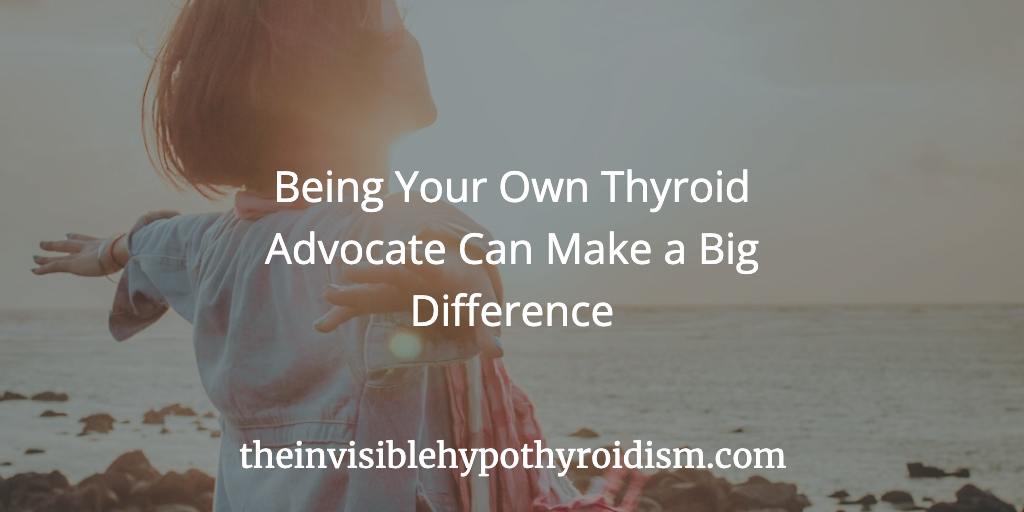Originally published on 3rd April 2016 Last updated on 15th May 2024
You would think that finding a doctor who will listen to you and treat you like an individual, giving you the treatment best for you, would be pretty easy… but it’s not always.
I’m going to tell you why you can embrace being your own health advocate, researching and learning lots about your thyroid condition, and why finding a doctor who will listen to you and treat you as an individual patient is hard to find, but invaluable.
It Happens All Too Often
In the Facebook support group I created, this happens most days;
Someone joins the group, and their first post is one big worry. Full of questions, including basic things, that their doctor hasn’t told them.
All their doctor has told them is that they have hypothyroidism and they’ll need medication for the rest of their life, then proceeds to hand them a prescription, before sending them away. This isn’t right, surely?
I was lucky enough for my GP to explain the process of how hypothyroidism occurs, and he even drew me a diagram. But it’s not like that for most thyroid patients. And this appointment was a one-off. After this, he just didn’t have time for me and any questions I had.
So Many Questions
The things a lot of people ask when they first join the group include:
“Will this get worse?”
“Will I ever get back to normal?”
“What is hypothyroidism?”
“So what do I do now?”
“What will the thyroid medicine do?”
“What are the symptoms?”
“Can it kill you?”
The first things we tend to ask these new members, are
A) What their doctor actually told them
and
B) What medication they have been put on.
No one should leave their appointment scared, upset or confused.
I remember vividly, the worst doctors appointment I have ever had. I left feeling all those things, and I broke down in tears outside the room. I proceeded to start up this blog, decide to become my own thyroid advocate, and help others where I could too.
Empower Yourself
Without a doctor giving the patient the right information, they may not make the best decisions about their health or know where to start. Anyone treated this way can easily jump to the worst case scenarios and panic. This is where they look for answers elsewhere, like in the support group.
The frustrating thing is, it would have taken the doctor just a few minutes to explain what hypothyroidism means, which could actually make all the difference in how a person handles their diagnosis.
So, I always recommend patients do their own reading, read research, books, studies and get other patients’ experiences on having the condition, and then go in to your doctor again, armed with lots of new knowledge, and aim to build up a good relationship with that doctor.
I tell thyroid patients to keep trying different doctors until they find one they can build mutual respect with. One who will listen. I tell them to write down everything they want to say so that the intimidation of a trained professional doesn’t make them forget anything. I explain to them that you’re best working together as a team and let them know that you want to be a partner with them in your healthcare. After all, you are an active participant in your own health.
If a doctor will not listen or try to understand where you are coming from, keep trying different doctors or medical professionals until you find one who will. Push to see a thyroid specialist, or an endocrinologist if possible, or go private or see a functional or holistic doctor who will help you.
You could even order your own tests from laboratories, but you may need to learn how to interpret the results too.
The Reality
The sad truth is, that in the UK especially, until we get a much needed overhaul of the NHS, we are going to have overworked, pushed-for-time doctors (and nurses), with small budgets, resulting in patients who are not going to get all the information and care that they need.
And internationally, until mainstream medicine catches up with a range of thyroid treatments and management options of thyroid disorders often promoted by more progressive medicine, patients will carry on feeling unwell due to non-optimal treatment.
Therefore, we can be our own thyroid advocates and prepare to stand up for ourselves, doing lots of research, to make sure we get the best care we can.
And most importantly, listen to your body. You know better than anyone if something isn’t right.
Have you experienced something like this?

You can click on the hyperlinks in the above post to learn more and see references to information given.
Related post: A Rant: Why It’s Important to Be Your Own Health Advocate




